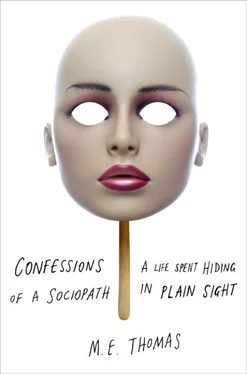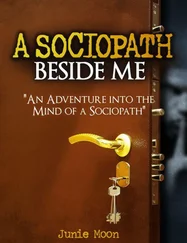I was surprised that he didn’t take my offer. In retrospect, I gather that his feelings were hurt by my spreadsheet. I guess I had hoped that, as a high-functioning autistic, he would regard it as an effort at saving the relationship rather than an insult to his personhood. I had hoped that the trade-off to dating an Aspie was that his feelings would not be the veritable minefield that empaths’ emotions are. I had hoped that I would be able to have the stable relationship with him that I had been unable to find with empaths. I still wonder whether it is possible to have a normal, long-term relationship with someone. Will I ever be married? For longer than a few years? It seems like all I ever end up with is a string of bad breakups.
I am terrible about breaking up with people. Once I lose interest in someone, I usually prefer to string them along until they leave me alone of their own accord. I would rather have the inconvenience of this than the possibility of an emotional scene. I don’t really understand when people get emotional about things, and I can’t stand it when people cry in response to something I have said or done. I feel like it is such a cheap shot, particularly since if they know me at all, they should understand that I am not going to be able to deal with those emotions. It’s like expecting someone confined to a wheelchair to walk up the stairs, or maybe being mad at your child for not being the gender you wanted him or her to be. As one of my blog readers put it, “All emotionally stunted people get frustrated with overly emotional people. It’s like being yelled at in a language you don’t understand.” In fact, one of the only surefire ways to make me upset/angry is to cry when in a confrontation with me. So, because I want to avoid the loss of control and damage that can be done when I am upset or angry, along with wanting generally to avoid unnecessary unpleasantness, I try to avoid an emotionally charged dissolution to a relationship.
Most psychologists think that sociopaths cannot love, but that theory seems silly to me. Just because it is a different kind of love, more calculating and self-aware, doesn’t negate its existence. This misconception springs from some illusion that the capacity to love is a form of goodness—that one’s love constitutes an unadulterated gift that arises out of selflessness rather than selfishness. But I do not believe this is true.
For example, most people do not have children for the benefit of those children. You cannot give to that which does not exist—that which would never risk torture, illness, or heartache had you not brought it into being. But when I see my sister unable to resist smiling in the company of her shiny-blond, rosy-cheeked toddler, I can imagine no greater love. I, too, am overrun with feelings of love for this tiny, just-formed being, knowing that there are genetic landscapes written into my heart that make it so. She’s endlessly charming to me. Her mere existence in the world pulls chemical levers and pushes enzymatic buttons that produce in me immense joy. Generosity and affection are simply its symptoms and side effects. Evolutionary biologists have long puzzled over the adaptation for love and its attendant expressions of generosity and kindness, theorizing that altruism ensures the survival of genes through one’s kin. So-called inclusive fitness theory basically holds that you are willing to be altruistic to another person in proportion to the advantage it will give your own genes in survival. In other words, you share half of your genes with your siblings, so you should be more willing to help them than, say, your cousin or even your nephew. This theory, however, has lately been the subject of much controversy, as some scientists have begun to challenge the theory on the basis that the math doesn’t add up. Still, for whatever reason it pleases me to promote my niece’s existence. It behooves me to give to her whatever I can to induce pleasure in her, which infects me with a glittering, light-filled happiness. Mirth, ecstasy, whatever you want to call it. We all want this for ourselves. Sociopaths, too.
When I was in my early twenties, I learned to love a girl named Ann who had beautiful eyes and soft overgrown hair that covered her face. She was a musician. She played one of those unpopular nerdy instruments that never garner any glory or fame, but she played it beautifully. For a time in my life, my skin crawled and my body ached when I was away from her for any stretch of time: a few hours of not being able to lazily brush my fingers against her skin, a weekend of not feeling her even breath in my presence—unbearable. I felt like she was the first person who really saw me, and that allowed me to trust her in a way that I had never managed to trust a person before.
We met on a music tour together, but she didn’t pay much attention to me until she noticed me messing with a damaged person in the group—another musician, with red hair, moderate skill, and clear psychological problems. Ann wasn’t mad, only curious. To me that was a sign that she was susceptible to me—reacting with curiosity where most would react with judgment. I asked her why we weren’t friends, knowing she would appreciate directness as a sign of honesty and courage. She was charmed. “There’s no reason why we aren’t friends.”
We spent the next three and a half weeks together. This was in the midst of my ostracization, when the other students in my program had decided to have nothing to do with me after I had read that girl’s diary. I hadn’t realized how lonely I had been, how much I missed connecting with other people. I tried to be around her as much as I could, so much so that her friends got concerned, asking her if I was bothering her, wondering why such a good person as herself would allow such a bad person as me to keep her acquaintance. When we rode on buses together for long trips, I would sleep with my head in her lap. It was such peace. It was as if I had found a port in a storm that had been raging for so long I did not know what it felt like to sail in fair weather or to touch my feet on solid, unshaking ground. From the comfort of land, I could see how wet and cold I had been, how bereft of human contact, how sick—and I never wanted to be those things again. I cannot describe those first days and weeks with Ann without feeling an acute pain. Loneliness is never as awful as its immediate aftermath, because at the time, you are so occupied with enduring it that you can’t bear to comprehend its awfulness.
Ann saw me as a broken thing, a thing to be fixed. And in a lot of ways, she did fix me. She taught me that there were more sustainable ways of meeting my needs and that self-control was a prerequisite to them. Before her, I had been so impulsive. I used to just leave and hope things worked out. I walked in front of cars to make them stop. I traveled with no money. I hit people. Things often didn’t work out. Watching Ann live her life, I realized that it was okay to consider the future—that living without thought of it ensured nothing but discomfort. And I wondered why I had lived in discomfort for so long.
Part of it was that Ann sold me on forever. She said we would always love each other and that she would make sure of it. I had never heard anyone speak so certainly about something so inherently uncertain. I didn’t believe her, but she saw my thoughts and replied, “No, I mean it. Even if you killed my mother. I’m not saying that you should kill my mother, of course, because you really shouldn’t. But if you did kill my mother, I would be very angry and very sad, but I would still love you and I wouldn’t leave you.”
It was so absurd that it seemed true. I trusted her, and I had never trusted anyone. Unlike anyone I had ever known, she told me she didn’t want to be shielded from my thoughts, listening for hours to my megalomaniacal rants about “ruining people” and other hobbies. It was so refreshing to not have to wear a mask, but I kept waiting for the other shoe to drop. Part of me wanted to test her tolerance, maybe even prove her wrong about always loving me. I kept confessing sin after sin, but she never recoiled. I was so used to the opposite reaction from people. I had, in fact, just been severely socially sanctioned for something as small as stealing a diary. Ann didn’t think I was a monster for these things, or perhaps she did but professed her love to me anyway.
Читать дальше












